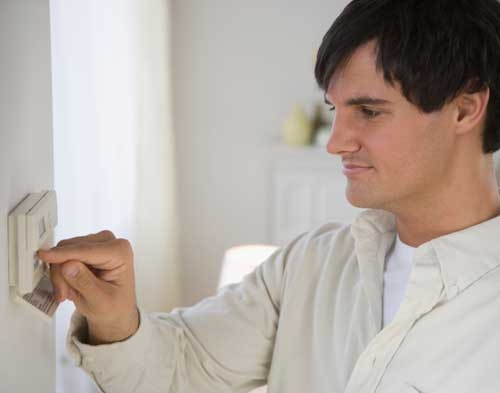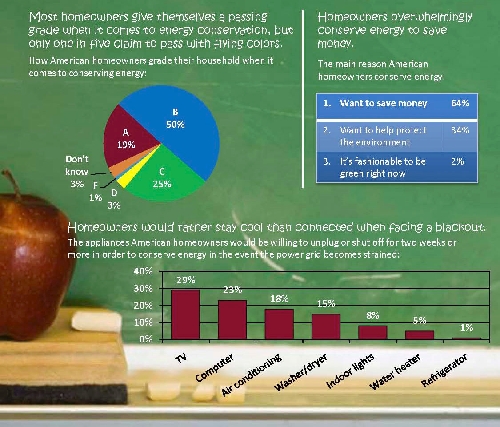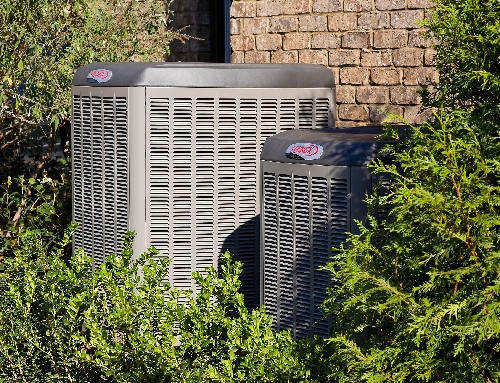Powerful lesson




It’s Aug. 4 and you’ve probably just received your power bill for July. Undoubtedly, the triple digits on the bill have soared as much as those on the thermometer outside.
Now, you’re wondering just what you can do to save energy and lower your costs.
Relax, you’re not alone. A recent Home Energy Report Card created by Lennox, manufacturer of air conditioners and heaters, showed that 64 percent of those surveyed were looking for ways to conserve energy so they could save money.
The survey, conducted in May, allowed homeowners to grade themselves on their energy conservation efforts. Half of the 795 respondents gave themselves a B, and only 7 percent were unsure or said they deserved a D or F.
“I think I would give them an E for effort,” said Brandon Chase, Lennox’s home energy expert, about homeowners’ efforts to conserve energy. “Ultimately, I think we all realize there is more that can be done. It’s kind of like working out or being on a diet. We all understand what needs to be done, we just need the discipline to follow through. Overall, they want to be more efficient, but they don’t always do simple things they need to.”
For starters, Chase said there are plenty of small things homeowners can do fairly inexpensively to save energy. Replacing the filter for an air-conditioning system gets more dust out of the system and prevents it from getting everything covered in dirt. It allows the system to cool quicker and more efficiently, as well as extending the life of the air conditioner. It’s also a task the homeowner can easily do without hiring a professional.
NV Energy adds that if you lightly spray the filters with lemon furniture polish or vegetable oil cooking spray, it will trap even more dirt and dust particles.
Fortunately, it seems that most homeowners already are aware of the benefits of changing their filters, as 82 percent of survey respondents said they do this on a regular basis.
They also have taken steps to reduce the heat created by incandescent light bulbs, with 79 percent reporting they have switched to compact fluorescent bulbs.
According to NV Energy, this simple switch will save about $1 for every four to six hours a bulb is on. Additionally, the compact fluorescent bulbs don’t generate as much heat so the air conditioner doesn’t have to work harder to cool down the house when they are on.
Both Chase and NV Energy recommend installing a programmable thermostat that automatically controls temperatures in the home.
“In most cases, homeowners can install them themselves,” he said, stressing how important it is to make sure they are set correctly. “If used appropriately, on average for every 1 degree of temperature you set the thermostat up, the Department of Energy says that translates into a 4 percent savings of energy.”
In cities such as Las Vegas and Dallas, where Chase lives, those slight changes can have a big impact.
Lennox’s survey shows 59 percent of homeowners are taking advantage of a programmable thermostat.
Another place with a slight adjustment to temperature equals big savings is the water heater. Sixty percent of survey respondents have lowered the temperature on their water heaters, with 88 percent of those believing that equals considerable savings.
A water heater blanket and insulation on the hot water pipes also will keep the system operating less often and more efficiently, according to recommendations from NV Energy.
Since an air conditioner is one of the biggest energy users in the summer, Chase said it is extremely important to make sure it is operating properly.
“It’s more costly but more efficient to get your air conditioner routinely serviced and checked,” he said. “If you keep it running well and serviced, it will be more efficient and last longer. It’s just like how a car would be getting less gas mileage if you didn’t change the oil or keep enough air in the tires.”
A certified professional will ensure there are no leaks in the system and that it is working at its peak level of efficiency. Additionally, replacing an old, inefficient air conditioner can reduce an electric bill by as much as 50 percent, Chase said. There are even systems that produce their own power through solar panels.
And be sure that the duct work is adequate for the size of the air-conditioning system.
“You can buy the most efficient piece of equipment or an air conditioner worth thousands of dollars but if you don’t install it correctly — for sizing and duct work — then it won’t benefit you,” Chase said.
Finally, he said it’s important that a home is well-sealed and properly insulated.
NV Energy says it’s possible to save 25 percent on energy costs if the home has the proper insulation in the floors and ceiling.
“If the insulation is not thick enough in the attic, you can be losing a lot of heat or cool the system is generating. The insulation requirements in newer homes are more stringent, but in most older homes the insulation has probably never been checked,” Chase said.
“To check if you have air leaking out of your home, you can feel around windows and doors. If you feel a breeze coming out of house, it’s not well insulated or sealed. Then, a good percentage of what you are producing is going out of house; your system has to work more to produce the same amount of cool,” he added.
For more energy-saving tips from NV Energy, visit www.nvenergy.com/saveenergy/home/energytips.cfm. For information about air conditioners and certified HVAC professionals, visit www.lennox.com.












